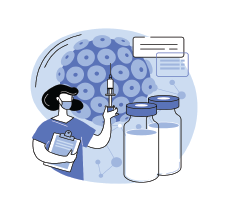
© Visual Generation / SHUTTERSTOCK.COM
No one expected dermal fillers to be an obstacle to widespread COVID-19 vaccination. But when reports emerged that three patients had experienced facial swelling after receiving the Moderna vaccine—and that a history of hyaluronic acid dermal filler injection was the common denominator linking these reactions—some people began expressing hesitancy to receive the vaccine.
Explore This Issue
August 2021Lara Devgan, MD, MPH, a board-certified plastic surgeon in New York City, told Allure magazine that she had “patients saying they’re too scared to get the vaccine because they like their fillers.” Unsure if her patients were outliers or representative of a larger trend, Dr. Devgan polled her 410,000 Instagram followers and was shocked to learn that 27% of those who responded said they’d also refuse the vaccine due to concerns regarding filler/vaccine reactions (Allure. January 20, 2021).
When the first filler/COVID-19 vaccine reaction reports emerged in December 2020, reported through Moderna’s FDA Briefing Document, “there was limited information, so we didn’t have much data to go on to advise patients,” said Theda Kontis, MD, an associate professor in the departments of otolaryngology–head and neck surgery and plastic and reconstructive surgery at The Johns Hopkins Hospital in Baltimore. “Physicians were making up their own rules about when to inject or not inject fillers around the timing of patients’ vaccinations.”
Since then, additional data have revealed that filler/vaccine reactions are rare, self-limiting, and little threat to overall health. However, the spate of attention generated by news of vaccine reactions in patients who had previously received dermal filler injections highlighted an important fact: Given that more than 2.6 million visits for filler injections occur annually in the United States (Facial Plast Surg Aesthet Med. 2021;23:75-76), and that today’s fillers can persist in the body for eight years or more, otolaryngologists and other physicians play a crucial role in educating patients and managing vaccine reactions.
“As physicians, our primary responsibility is to consider the bigger picture in the health and safety of our individual patients and also society at large,” said Arianne Shadi Kourosh, MD, MPH, assistant professor of dermatology at Harvard Medical School in Boston.
Reactions to COVID-19 Vaccines Are Rare
The worldwide incidence of delayed inflammatory reaction (DIR) occurring because of any triggering event—not solely COVID-19 vaccine injection, or vaccine injection more broadly—is “thought to be 0.8%,” according to a 2021 JAAD Case Reports article (JAAD Case Rep. 2021;10:63-68).